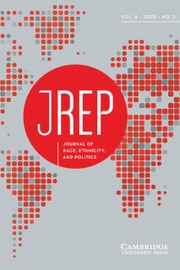It can no longer be said that there is a shortage of studies (even book-length ones) on the phenomenon of “White Christian nationalism.” Within the past 4 years, there have been a number of volumes, written primarily by journalists and historians but some sociologists as well, on the dangerous mixture of ethno-religious myth, will-to-power, and resources that help explain the white evangelical politics, the Tea Party, Trump’s Presidency, January 6, and what lies in store for American democracy. The concept of “Christian nationalism” has become so popular, in fact, that reactionary authors are now embracing the label in their own books (Torba Reference Torba2022; Wolfe Reference Wolfe2022), and updated editions of books about religion and Trump are changing their subtitles to include “White Christian Nationalism” (Denker Reference Denker2022; Posner Reference Posner2021).
But The Everyday Crusade, written by political scientists Eric L. McDaniel, Irfan Nooruddin, and Allyson Shortle, offers something different from the slew of volumes now emerging. Though most attention has been given to the language of elite leaders or the machinations of interest groups behind the scenes, these authors draw on perhaps the largest cache of national and state-level data collected over a decade to assess how the “ideology in narrative form” of “American religious exceptionalism” shapes Americans’ understanding of national belonging, political order, and America’s place in the world. In doing so, they provide a valuable contribution to our national discussion.
In the Introduction and Chapter 1, the authors stress the importance of national myth and clarify their definition of American religious exceptionalism (hereafter ARE) as “The myth that contends that the United States’ creation and purpose are part of a divine plan. The nation was not created by chance; it was created by a Supreme Being to stand above all others and to lead them to a higher form of being” (p. 3). It is critical for the authors’ argument to understand that ARE is not only about divine blessing, as we might take from a more liberalized civil religion, but that America has been chosen by God to lead the world from a position of advantage. This requires purity from all who would corrupt America’s greatness and divine purpose.
Chapter 2 is where the authors explain how ARE is operationalized in most of their original surveys. True to the term, their measure captures a broad understanding of America’s divine chosen-ness. Questions include statements like “America holds a special place in God’s plan” and “the United States is spiritually predestined to lead the world.” After making an ARE scale (ranging 0–1), the authors then create a three-category typology that they use throughout the book to explore ARE’s association with various political attitudes. “Dissenters” are those who score roughly in the lower third of the ARE distribution; “Laity” in the middle third; and “Disciples” in the top third. Similar to Whitehead and Perry’s (Reference Whitehead and Perry2020) category of “Ambassadors,” the authors find “Disciples” represent roughly 14–21% of the samples surveyed.
After providing the demographic breakdown and personality profiles of their three orientations to ARE, the remainder of the book assesses how these orientations correspond to key political attitudes after controlling for relevant demographic, religious, and political characteristics. Predictably, the authors find that being a “Disciple” rather than a “Dissenter” reliably predicts that Americans affirm blind patriotism, racial resentment and white supremacy, Christian supremacy, Islamophobia, xenophobia, threatened masculinity, militarism, certain forms of isolationism, and Trump support.
Importantly, in Chapter 7 the authors assess the extent to which ARE appears among and influences the political beliefs and behavior of racial minorities. The authors find that racial minorities often embrace ARE at levels equal to or above those of whites. However, ARE does not influence minorities’ political views and behavior the same way. Though ARE seems consistently associated with support for reactionary politics and increases political engagement for whites, ARE does not consistently drive minority support for conservative or Republican candidates, but it does seem to suppress their political engagement. Thus, while ARE does not necessarily promote ultra-conservative political views and behavior for minorities, it nevertheless may contribute to the same by suppressing political behavior that might otherwise promote more inclusive or equitable politics.
Despite all the analyses, more questions remain that are beyond the purview and possibilities of this book given its data. How does “American religious exceptionalism,” and its measurement align with more popular concepts like “white Christian nationalism”? What are they both really capturing? Are questions used to measure either concept more about ideology or indicators of group identity? And to what extent is either construct simply proxy for more ethnic (rather than strictly religious) concerns? Rather than representing shortcomings of the book, however, these sorts of unanswered questions just underscore how generative this project can be.
Overall, the authors provide a theoretically nuanced, historically informed, and empirically supported argument for our need to understand American religious exceptionalism, both in the academy and in the broader national conversation. ARE represents a nationalist myth that allows a large number of (primarily white) Americans to maintain hierarchical arrangements at home and “America First” policies abroad. As the number of volumes addressing the topic of religious nationalism increases, The Everyday Crusade is one that should not be crowded out of the conversation in our classrooms, research agendas, or public discourse.


